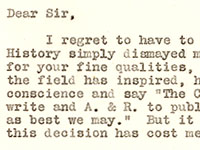
 Your
first chapter would lead the discerning public to think that you do not know
what to say, and that, if you did, you could not say it … The chapter would
suggest that you have no conception of, and no power to discharge the
historian’s duty in the highest.
Your
first chapter would lead the discerning public to think that you do not know
what to say, and that, if you did, you could not say it … The chapter would
suggest that you have no conception of, and no power to discharge the
historian’s duty in the highest.
In 1919, C. E. W. Bean, former war correspondent and journalist, was appointed to write the official history of Australia’s part in World War I.
This remarkably frank letter from the publisher, George Robertson, initiated a series of events by which Robertson forced a rewriting, including the removal entirely of Bean’s 1500 word opening in which the Australian soldier was cast as unique among the world’s armies, symbol of the nation, and through whose deeds ‘the Australian nation came to know itself’. Robertson thought this was ‘tosh’.
Bean had the final word, though, because he included these words as an epilogue
in his last volume published in 1942, long after Robertson’s death. Bean’s words
are now quoted regularly on Anzac Day and Remembrance Day. This epilogue has
become the best known passage in the Official history.
Display item World War I papers, 1919-1933
< Previous Exhibit | Back to The Exhibits page | Next Exhibit >